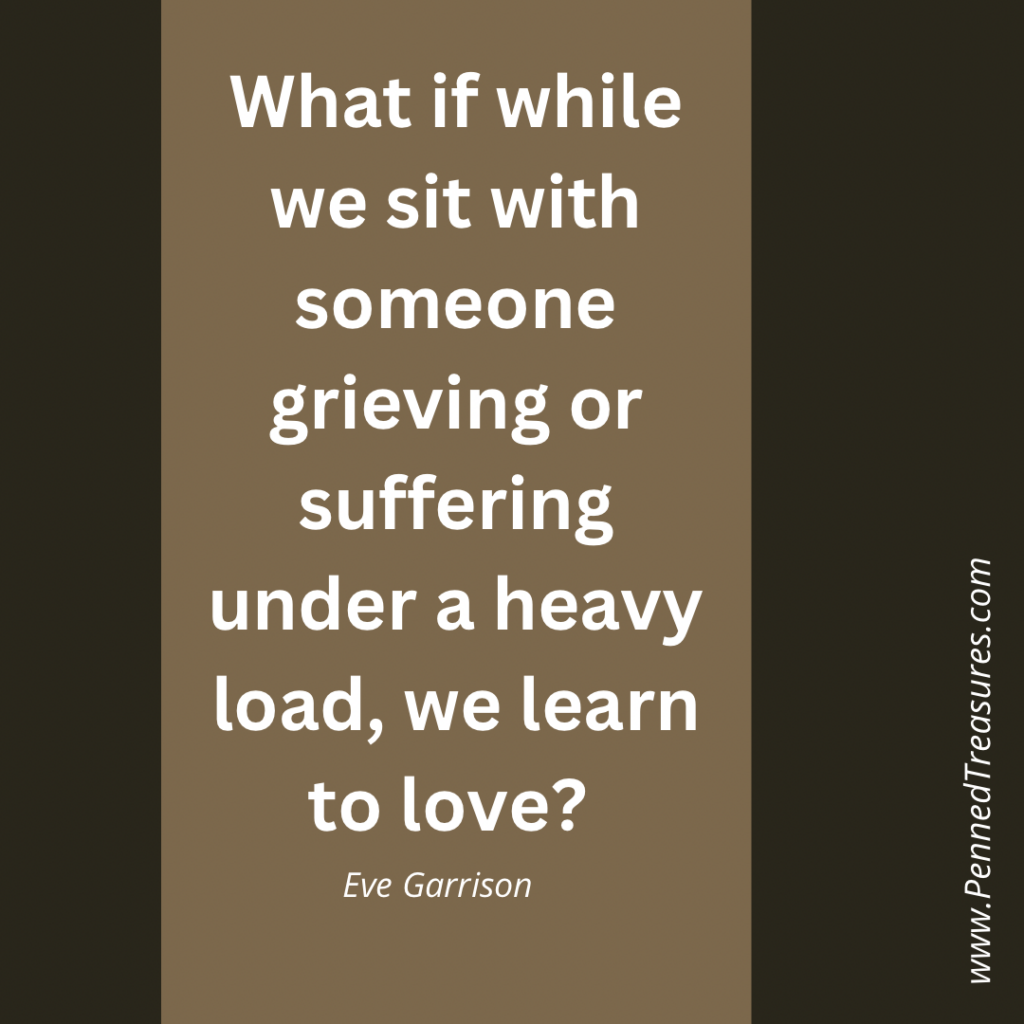
It’s been a strange month. I’ve experienced situations that triggered past tough life moments through various avenues. In each of these, I’ve been able to share something positive out of the memories with someone. While in the most challenging part of our life so far, God answered prayers for a greater purpose. But even in remembering, I still shed tears, tears that grieve what was lost or stolen in those years AND tears of joy, realizing in gratitude what could have been far worse. I’ve been able to empathize with others in similar situations. I find the tears healing, especially while resting on my husband’s shoulder and reflecting.
As I processed the pain with him, I noticed my tears soaking his shoulder. My immediate response was to apologize, even though Greg has repeatedly expressed that it is a privilege to be there for me. This time, it hit me. As Greg provides relief by listening and letting me release the tension without judgment, he is practicing the love of Christ. The thought came at that moment, “Perhaps our tears water the growth of someone else’s love.” This doesn’t mean we should sit and wallow in our pain with someone, but we should find safety with one or two fellow believers to express what we are struggling with. If we keep everything to ourselves, are we stifling another’s chance to practice love?

From another perspective, what if while we sit with someone grieving or suffering under a heavy load, we learn to love? What if every time we allow ourselves to be inconvenienced for the sake of someone else, we receive something so valuable that it cannot be attained any other way? This can be a difficult place to sit in because we may experience an emotional discomfort we would rather flee from. It is a choice we make to enter into even a little bit of suffering with someone else. We are often tempted to self-protect and hush the other person because we are uncomfortable. But what if the gift of being there for another is a gift received? What if it heals us, too? I believe love for others grows within us when we deny our self-serving ways for the sake of another.
In other words, when we shoulder the burdens of another, we practice the art of carrying our cross and denying ourselves, just as Christ asked us to. And what if we are, in turn, rewarded even though we don’t yet understand that reward? (See Matthew 16:24-26 regarding denying ourselves.)

Christ himself carried every burden to the cross. It’s not a coincidence he shouldered the wooden cross he was to die on. Nor is it a coincidence that another man was pulled out of the crowd to help carry the cross for Christ. (See Matthew 27:32) There is great symbolism here with a lesson to understand. Christ can empathize more than any of us because of the suffering he endured, carrying the weight of our sins. Holding the weight of someone else’s suffering is nothing compared to what Christ did for us. When we are there for others, we are not alone. Christ is with the believer; he is there for both the person in pain and the one who is helping hold it. It is through his stripes we are healed! Christ went first to give us an example. Let’s follow!
The idea of being there for others is counter-culture. We hear messages in our psychology-minded world to set our boundaries repeatedly, self-preserve, and self-protect. And to some point, we do need to be healthy. We don’t want to become so enmeshed in another’s life that we neglect our family or other avenues in which we are called to follow Christ. To neglect our family is not love. Following into people-pleasing can lead to exhaustion and confusion about our authentic assignment from the Lord. To say yes to every presumably good charity or volunteer opportunity can be a distraction from using our very best for the Lord. They become religious duties, burning out a person, rather than acts of love and mercy that are outflows of time spent filling up in Christ’s love for us.
When I mention being there for others, I’m saying it’s essential to be willing to help carry another’s pain—to sit with them rather than lecture, to empathize rather than hurry away someone’s grief, to be there to listen rather than fix. This takes time away from electronics and superficial relationships. This is where authentic connection forms and love grows in you and me.
I believe there is a place for denying ourselves for the sake of another so that they may turn to Christ and be healed. It’s important to let others work out their suffering rather than trying to rush the process for them. My husband was doing that. He wasn’t consciously thinking, “I must be there for my wife and help her turn to Christ.” He was naturally letting the flow of love and kindness in his heart help me carry the pain I was facing. He wasn’t rushing or hushing me or telling me to stop crying. He wasn’t scrolling through his phone either. In the process, I was given a safe space to let Christ work through my thoughts and let them go. That is denying oneself. That is love.